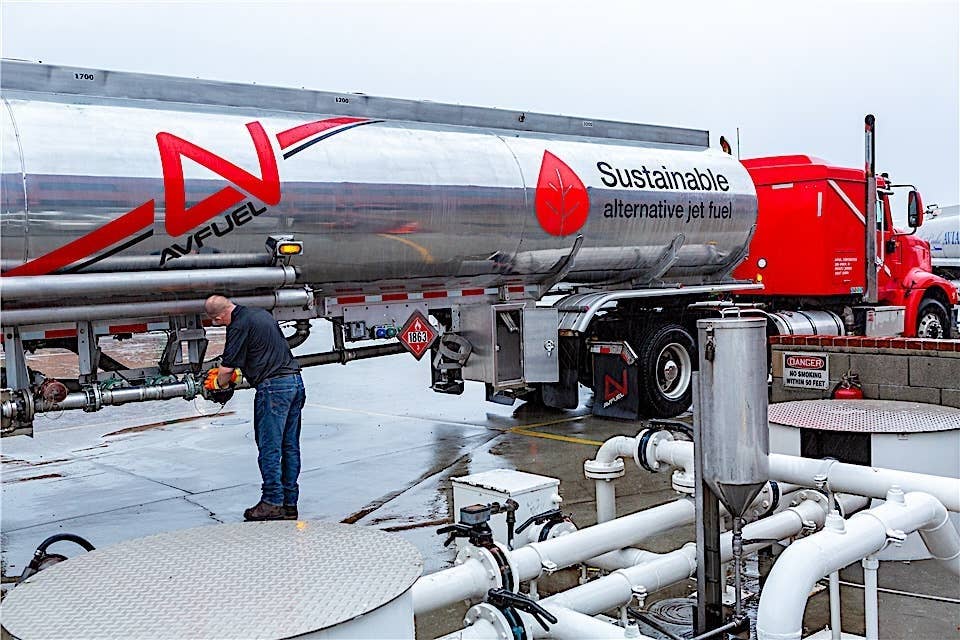Gevo To Start Building South Dakota SAF Plant in September
Colorado-based company aims to use renewable energy sources to make sustainable aviation fuel.

Boeing and Gevo customer Alaska Airlines have been flight testing SAF. [Courtesy: Boeing/Paul Weatherman]
Colorado-based Gevo (NASDAQ: GEVO) plans to break ground this September on a new facility in Lake Preston, South Dakota, that will produce sustainable aviation fuel (SAF) and other low-carbon fuels.
“It's going to show the world what's possible,” said Gevo CEO Patrick Gruber during an investment call on Monday. “It’s going to show that sustainably produced raw materials can be converted into SAF with energy-efficient production processes.”
The facility, dubbed Net-Zero 1, is expected to produce SAF and other fuels by using renewable energy sources such as wind and hydro-electric.
“We can displace the fossil-based energy that's the electricity and the heat sources, get rid of the methane from fossil base, and swap them out with renewable energy, and make it all profitable to produce our jet fuel,” Gruber said. “We continue to evaluate additional plant locations as we map out the path forward beyond Net-Zero 1.”
The company said it’s already identifying and performing early site development work for additional SAF production locations to help Gevo achieve its production and sales goal of 1 billion gallons of SAF per year by 2030.
Gaining Momentum
The news comes as SAF production gains momentum from recent victories in Congress as well as support from the White House, general and business aviation associations, and major U.S. airlines.
Burning SAF emits significantly fewer greenhouse gas emissions than conventional fossil-based aviation fuel. It’s made by mixing conventional fuel with various renewable materials including cooking oil, plant oils, agricultural residues, and municipal waste.
Globally, civil aviation produces about 2.1 percent of all human-induced CO2 emissions, according to the Air Transport Action Group. That number is expected to rise significantly by 2050 based on projected increases in air miles and continued decarbonization by other sectors, according to a European Parliament report.
Worldwide SAF production stands at 26.4 million gallons a year—a tiny fraction of all aviation fuel. These low production numbers prompted President Joe Biden to set a national goal to produce at least 3 billion gallons a year by 2030.
Availability of SAF at FBOs in the U.S. is increasing and a few airlines are already using SAF to fuel their aircraft, but ramping up production and access are still key hurdles that need to be overcome before SAF can become widely embraced across the aviation community.
Airline Partners
Net-Zero 1 is expected to produce about 55 million gallons of SAF yearly. It’s designed to produce 62 million gallons of low carbon fuels a year including 55 million gallons of SAF. Plans call for the facility to begin fuel deliveries in 2025.
Financing for construction will come from Gevo’s SAF supply agreements, including deals with Georgia-based Delta Air Lines (NYSE: DAL) and British Airways, for a combined 105 million gallons per year.
Gevo has also won SAF supply agreements with American Airlines (NASDAQ: AAL), Alaska Airlines (NYSE: ALK), Japan Airlines, Finnair, and Aer Lingus, for a combined total volume of 155 million gallons per year of SAF.
Altogether, Gevo now boasts more than 350 million gallons per year of committed SAF offtake with an applied hydrocarbon revenue value estimated at over $2 billion per year, the company said.

Sign-up for newsletters & special offers!
Get the latest FLYING stories & special offers delivered directly to your inbox






